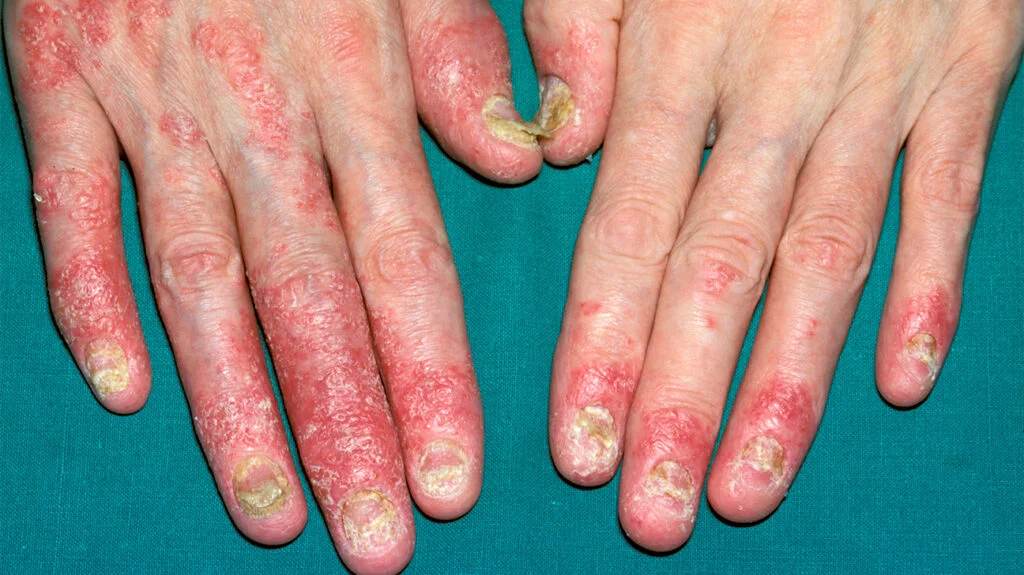Psoriatic Arthritis
Psoriatic Arthritis
- Psoriatic Arthritis (PsA) is a chronic autoimmune inflammatory arthritis.
- It occurs in some people with psoriasis, a skin condition causing red, scaly patches.
- In PsA, the immune system attacks both the joints and the skin, leading to inflammation, pain, and stiffness.
- Without timely care, PsA can result in joint damage, deformity, and reduced mobility.
What are signs and symptoms of Psoriatic Arthritis?
- Joint pain, swelling, and stiffness, often worse in the morning.
- Sausage-like swelling of fingers and toes (dactylitis).
- Spine involvement causing back pain or stiffness (spondylitis).
- Nail changes such as pitting, ridges, discoloration, or nail lifting.
- Reduced range of motion in affected joints.
- Fatigue and general tiredness.
- Skin symptoms: red, scaly patches of psoriasis may appear or worsen.
- Enthesitis: inflammation where tendons or ligaments attach to bone (commonly heels or elbows)
What are common causes of Psoriatic Arthritis?
Here are the common causes and risk factors of Psoriatic Arthritis (PsA) in bullet points:
- Immune system dysfunction – The immune system mistakenly attacks joints and skin, causing inflammation.
- Psoriasis – Most people with PsA have a history of psoriasis; skin flares may trigger joint involvement.
- Genetic predisposition – Family history of psoriasis or PsA increases risk.
- Environmental triggers – Infections, injuries, or stress may trigger the onset in susceptible individuals.
- Age and gender – Typically develops in adults between 30–50 years, affecting men and women equally.
- Other autoimmune conditions – Sometimes associated with other autoimmune disorders.
Fast Facts on Psoriatic Arthritis?
- Chronic autoimmune disease affecting joints and skin.
- Often occurs in people with psoriasis (red, scaly skin patches).
- Joint pain, swelling, stiffness, and nail changes are common symptoms.
- Can affect fingers, toes, spine, knees, hips, and tendons/ligaments.
- Types of PsA: symmetric, asymmetric, DIP predominant, spondylitis, and arthritis mutilans.
- Typically develops in adults aged 30–50 years.
- Men and women are equally affected.
- Untreated PsA can lead to joint damage, deformity, reduced mobility, and increased cardiovascular risk.
- Treatment includes medications (NSAIDs, DMARDs, biologics), physiotherapy, lifestyle management, and regular monitoring.
How Psoriatic Arthritis is Diagnosed ?
- Medical history & physical examination – Doctor checks for joint pain, swelling, stiffness, skin psoriasis, and nail changes.
- Blood tests – Help rule out other types of arthritis (e.g., rheumatoid arthritis) and check for inflammation markers.
- Imaging tests – X-rays, MRI, or ultrasound to detect joint inflammation, bone changes, or damage.
- Family history – PsA is more likely if there’s a family history of psoriasis or psoriatic arthritis.
- Pattern of symptoms – Doctors look for specific signs such as asymmetric joint involvement, dactylitis (sausage fingers/toes), spine inflammation, or enthesitis (tendon/ligament inflammation).
How Psoriatic Arthritis is Treated ?
- Medications
- NSAIDs – Reduce joint pain and inflammation.
- DMARDs (e.g., methotrexate, sulfasalazine) – Slow disease progression and prevent joint damage.
- Biologics (e.g., TNF inhibitors, IL-17 inhibitors) – Target specific immune pathways to control inflammation.
- Physical therapy & exercise – Helps maintain joint flexibility, strength, and mobility.
- Lifestyle modifications – Balanced diet, regular exercise, avoiding smoking, stress management, and protecting affected joints.
- Skin care – Treat psoriasis with topical creams or medications as needed.
- Regular monitoring – Ongoing check-ups to assess joint health and prevent long-term complications.
What happens if left untreated ?
If Psoriatic Arthritis (PsA) is left untreated, the inflammation in joints and tendons can progressively worsen, leading to permanent joint damage, deformity, and reduced mobility. Chronic inflammation may also affect the spine and entheses (where tendons and ligaments attach to bone), causing stiffness, pain, and functional limitations. Untreated PsA can increase the risk of cardiovascular disease, metabolic issues, and decreased quality of life. Early diagnosis and proper treatment are crucial to control symptoms, prevent joint destruction, and maintain daily functioning.
How OARC Can Help?
At OARC, we offer holistic care to patients suffering from all kind of arthritis and autoimmune diseases by our renowned rheumatologist. Because of chronic illness of the disease, we spend some time with the patient helping them to know about their disease, and demystify the myths regarding the disease and treatment. We have collaboration with NABL accredited laboAStory where all kind of blood tests can be done at reasonable costs. We also have patient support system where patient can approach in case of any emergency. We believe in a friendly relation with patients so that they can share all their sufferings and get the best possible treatment.



